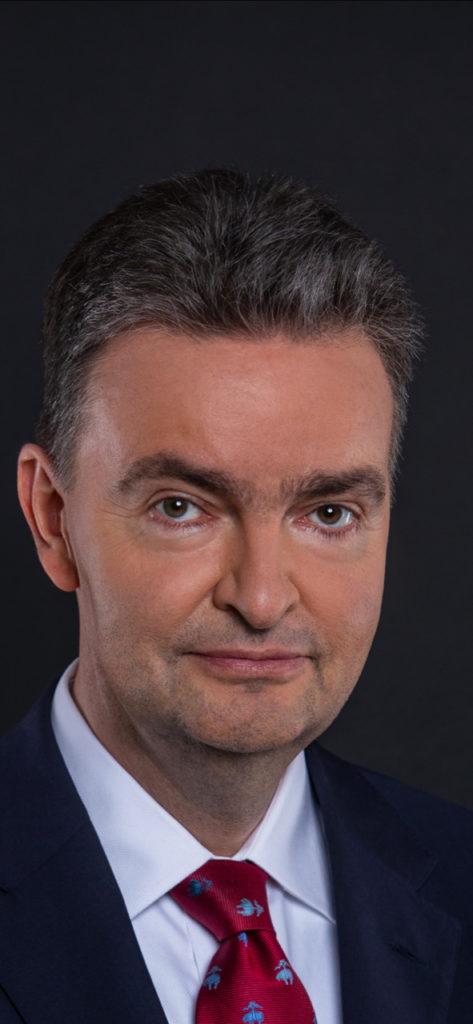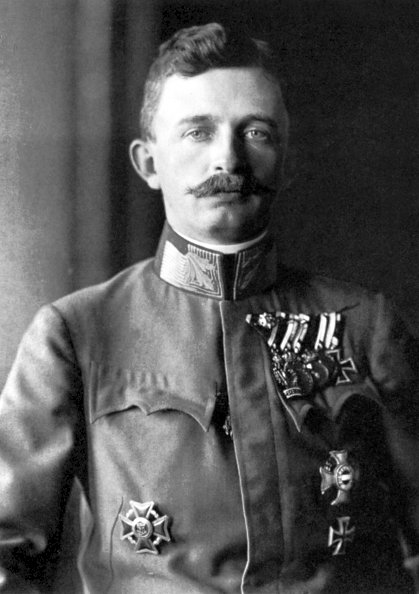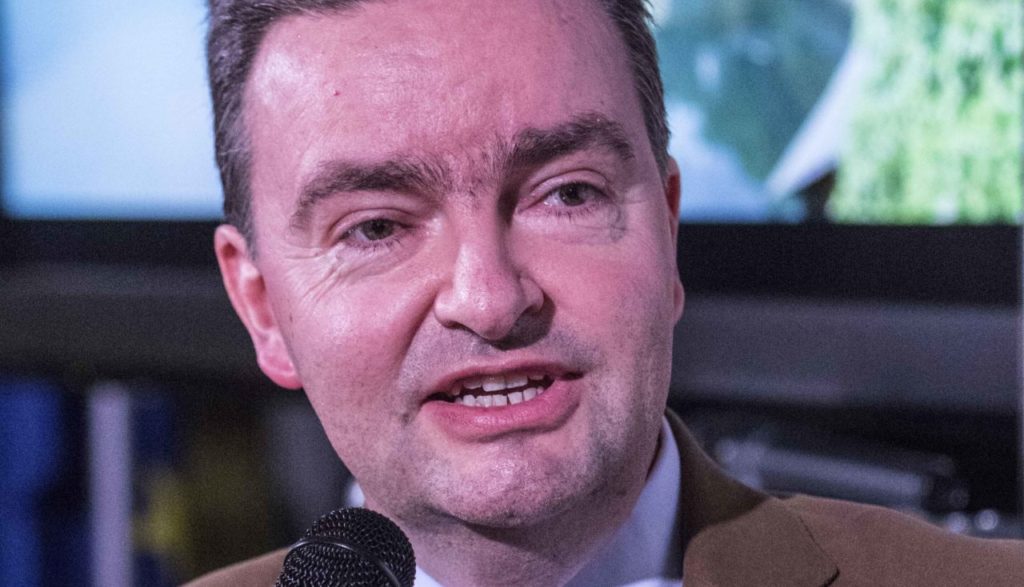Text of the interview in English
Text of the interview in German
On April 1, 1922, one hundred years ago, Charles of Habsburg, the last Emperor of Austria and King of Hungary, died on the island of Madeira (Portugal), at only thirty-four years of age. Charles I of Austria (Charles IV of Hungary) had been on Portuguese soil for a few months, where, exiled during the First World War, he had been welcomed in November 1921 with his family. A few months after his arrival, the emperor's health deteriorated until pneumonia ended his life. His wife, Empress Zita, who was expecting their eighth child, took care of him until the end of his days. His body rests in the church of Our Lady of the Mount, in Funchal, Madeira, far from the Crypt of the Capuchins in Vienna where the members of this dynasty that reigned in Europe for centuries are buried.

His name achieved special prestige in the Catholic world when he was declared Blessed on October 3, 2004 during a ceremony presided over by Pope John Paul II in Rome. Emperor Charles was recognized as a Christian model for his virtues and for his actions in favor of peace, supporting the efforts of Pope Benedict XV during the First World War. The Church also saw in his figure a model of a good Christian ruler, committed to the common good and the teachings of Christian social doctrine: Charles cared for his poorest and most abandoned subjects, reduced the luxuries of the Court and established the first Ministry of Social Development in the world. Not for nothing was he known as "the emperor of the people".
Georges de Habsbourg-Lorraine, grandson of Emperor Charles is, since December 2020, Ambassador of Hungary to France. This Austrian citizen (where his official German name is Georg Habsburg-Lothringen) and Hungarian (in Hungarian he is called Habsburg-Lotaringiai György), would have received the title of Imperial Highness and Royal Archduke of Austria, Prince of Hungary, Bohemia and Croatia, if the Empire still existed. The ambassador receives us in a room of the Hungarian embassy in Paris.
A century after the death of the emperor, your grandfather Charles, Central Europe is at war again. What reflection does this event inspire in you?
- There are two elements that seem to me primordial to understand my grandfather's government. Charles was first and foremost a soldier. We must remember that he never thought he was going to be emperor, because the line of succession was far from him. He knew the war and its consequences very well. This is an important element to consider in his efforts for peace: he knew what war was, so he wanted peace.
Another element that I like to highlight is the fact that he was very young when he became emperor: he was 29 years old. When he took over, it is necessary to consider that he succeeded his great-uncle Franz Joseph I of Austria who spent no less than 68 years in power, with all that this entails: it is a whole system that he inherited. The generals of Franz Joseph wanted the war, because they trusted in the power and in the greatness of the imperial army. Charles then had a lot of opposition in that system. The empire was immense and Charles quickly understood that with the war the integrity of the empire was in danger, and that is exactly what happened.
Despite this opposition in the state apparatus, my grandfather achieved some reforms, especially of a social nature. Because of his adherence to the Christian social doctrine, he had understood very well that some social transformations were necessary, as well as a new style of government that had to be adopted. This led him to travel a lot within the Empire, which was not so easy at that time, to get to know the reality of the people, their problems, their aspirations. This is how he conceived the first Ministry of Social Development in the world and also promoted a protective legislation for tenants that was very appropriate to the times of war where many people were left without money to pay their rents.
Because of his adherence to Christian social doctrine, my grandfather Emperor Charles I of Austria had understood very well that some social transformations were necessary, as well as a new style of government that had to be adopted.
George of HapsburgAmbassador of Hungary in Paris
Is the figure of your grandfather still relevant in these times of war?

- There is something that particularly impresses me in my grandfather's life that can inspire many people around the world. It is something I heard in the Vatican on the days of his beatification. Emperor Charles was not beatified because he was successful or because he achieved a great feat, because in fact, politically he failed because he did not achieve peace and ended his life in exile. What counts for the Christian vision of life is the daily journey, what one does or tries to do every day to do good, to work for the common good. And in this aspect my grandfather was exemplary. This is for me, personally, the great message he leaves us and which is very relevant in today's society in which we tend to give too much importance to results and not so much to effort.
In a more concrete and spiritual way, I think my grandfather is interceding for peace to return to Europe. There are many people who are praying to him for this intention. There are several relics of him. In Hungary I don't think his figure is so well known. Curiously, I was very struck by the fact that in France he is more so. There is, for example, a college named after him in the city of Angers. It seems to me that it is the only school in the world that has been given the name "Blessed Charles of Austria". Another example: a few days ago at an official lunch in Versailles, one of the guests remarked that his son was named Charles after my grandfather: he was very impressed when he learned who I was!
In a more concrete and spiritual way, I think my grandfather is interceding for peace to return to Europe. There are many people who are praying to him for this intention.
George of HapsburgAmbassador of Hungary in Paris
It has been said that Hungary has opted for a neutral position in this war. What is your government's position?
- It seems to me that this criticism is not well-founded. My country is a member of the European Union and NATO and as such we follow the sanctions and resolutions that have been adopted. On the other hand, we have sent a lot of humanitarian aid to Ukraine and have already taken in about 500,000 refugees. In Budapest, the consequences of the war are already visible with the presence of these displaced people. Without going any further, in my own house in Budapest we are hosting two Ukrainian families.
On the other hand, we have decided not to contribute weapons to the conflict. We do not want to put our citizens at risk. It should be noted that after the First World War, with the dislocation of the Austro-Hungarian Empire made official by the Treaty of Trianon in 1920, more than three million Hungarians stopped living in Hungary. Today there are about 150,000 Hungarians in Ukraine that we want to protect. We have already mourned the death of six Ukrainian soldiers of Hungarian origin in this war.
Finally, from the point of view of energy dependence, our situation is not exactly the same as that of the other members of the European Union. Indeed, we are 80% dependent on Russian energy. Entering into a conflict with Russia would be a serious danger for our population. Whether we like it or not, this dependence is real and is a legacy of recent Soviet history.
Today, in the midst of war in Central Europe, a Habsburg is ambassador in Paris during the French Presidency of the European Union. In your career as a diplomat, has your grandfather been a role model?
- Historical coincidences amuse me a lot. For example, a few days ago I presented my credentials to the Prince of Monaco, because in addition to being ambassador to France, I am also ambassador to the Principality. And I thought: "the twists and turns of history, a Hapsburg presenting his credentials to the Prince of Monaco!". Beyond the historical anecdotes, I have to say that my grandfather is a constant source of inspiration, but I have to admit at the same time that my father has had a much greater influence on my career. My father, Otto of Habsburg, the eldest son of the emperor and leader of the house of Habsburg, was a visionary politician and MEP for more than 20 years. He played an important role in the process of European construction and the inclusion, in the European Union, of the former nations that were part of the empire.
He was well aware of the historical responsibility of our family in the 21st century, which had been active in European politics for almost a thousand years, and taught us to live in modern society, to study and work like everyone else. I did university studies in law, history and political science in Austria, Germany and Spain. In the latter country, I was at the Complutense University of Madrid to study contemporary Spanish history and Islamic culture, which was not taught in Munich. I started working in audiovisual communication companies. Thirty years ago, I took up residence in Hungary, where I have been an ambassador since 1996. In particular, my father attached great importance to languages. Thanks to him, like him, I speak six languages (German, Hungarian, French, English, Italian and Spanish), which has obviously been very useful to me in my work as a diplomat.
What activities are planned for April 1, 2022, the 100th anniversary of the death of your grandfather Charles?
The main activity of this centenary will be a Mass that will take place in the church where my grandfather is buried, on the island of Madeira. More than one hundred members of the family will be present. At first I was not planning to attend because on Sunday, April 3, we have important elections in Hungary and at the embassy in France we have a lot of work to do to organize the elections. However, the Deputy Prime Minister of Hungary was kind enough to ask me to be present in Madeira for this occasion. So I will have the joy of being able to participate in this great event.









